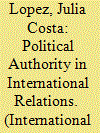|
|
|
Sort Order |
|
|
|
Items / Page
|
|
|
|
|
|
|
| Srl | Item |
| 1 |
ID:
145510


|
|
|
|
|
| Summary/Abstract |
While the historical turn in IR has produced significant advances in historicising both international relations and the discipline itself, the way in which the Middle Ages have been approached, studied, and referenced even in this historically-informed scholarship unwittingly works to reinforce two myths that these scholars challenge: Eurocentrism and Orientalism. The main goal of this article is to problematise the uses of the medieval that reinforce these narratives by unpacking the linguistic and conceptual constructions that underpinned the interactions between Latin Christendom and rest of the world. In doing so, it makes two closely-connected arguments: first, drawing from the abundant literature on historical sociology and Eurocentrism, it argues that we cannot understand medieval Europe, and particularly European identity-formation, without paying attention to its relations with the non-Christian world. Secondly, and most crucially, it shows that these interactions never rested on the unified idea of an ‘infidel enemy’ that seems to emanate from the IR crusading literature. Rather, an examination of the constructions of Jews and Muslims in canon law shows an extremely nuanced and varied conceptual apparatus that creates several dynamics of Othering – and consequently allows for a variety of ways of relating ranging from toleration and coexistence to conquest.
|
|
|
|
|
|
|
|
|
|
|
|
|
|
|
|
| 2 |
ID:
161744


|
|
|
|
|
| Summary/Abstract |
It is difficult to overstate the importance of the concept sovereignty for international relations (IR). And yet, understanding the historical emergence of sovereignty in international relations has long been curtailed by the all-encompassing myth of the Peace of Westphalia. While criticism of this myth has opened space for further historical inquiry in recent years, it has also raised important questions of historical interpretation and methodology relevant to IR, as applying our current conceptual framework to distant historical cases is far from unproblematic. Central among these questions is the when, what, and how of sovereignty: from when can we use “sovereignty” to analyze international politics and for which polities? Can sovereignty be used when the actors themselves did not have recourse to the terminology? And what about polities that do not have recourse to the term at all? What are the theoretical implications of applying the concept of sovereignty to early polities? From different theoretical and methodological perspectives, the contributions in this forum shed light on these questions of sovereignty and how to treat the concept analytically when applied to a period or place when/where the term did not exist as such. In doing so, this forum makes the case for a sensitivity to the historical dimension of our arguments about sovereignty—and, by extension, international relations past and present—as this holds the key to the types of claims we can make about the polities of the world and their relations.
|
|
|
|
|
|
|
|
|
|
|
|
|
|
|
|
| 3 |
ID:
172842


|
|
|
|
|
| Summary/Abstract |
In international relations, accounts of medieval political authority are divided between those who see a heteronomous patchwork of overlapping authorities and those who claim that the era of the state started in the twelfth century. How can we overcome this divide? I argue that IR's current difficulties in grasping the nature of medieval political authority stem from shortcomings in how the notion of political authority itself has been conceptualized. Thus, rather than starting from a substantive definition of political authority, I focus on contestation over the categorization and authorization of rule, that is, on how authority is produced in historically specific ways as a result of contemporary contestation over what political authority is, who is authorized, and how rulers stand in relation to one another. This reorientation allows us to appreciate how medieval political authority emerged from the competition between four sets of ordering categories: iurisdictio, potestas, lord/vassal, and magistrate. Each one of these four categories understood authority, rulers, and the relation between rulers in different ways. The problem with existing accounts of medieval authority is that they attempt to find the single ordering principle of medieval international relations. In doing so, they not only fail to capture the features of the time but also reinforce a particular approach to political authority that is unhelpful for understanding medieval and modern politics alike.
|
|
|
|
|
|
|
|
|
|
|
|
|
|
|
|
|
|
|
|
|